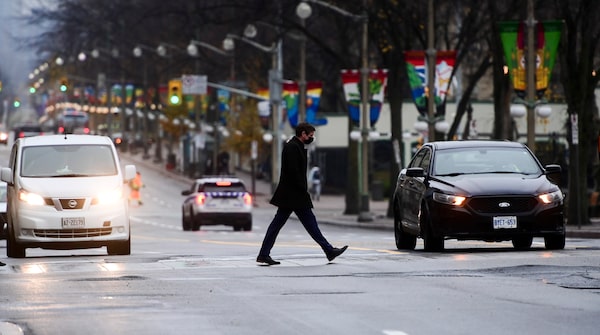
A pedestrian crosses Wellington Street in Ottawa on Oct. 26, 2020.Sean Kilpatrick/The Canadian Press
After Ontario Premier Doug Ford announced a new lockdown for Ontario on Monday, Finance Minister and Toronto MP Chrystia Freeland tweeted, “I support the additional lockdown measures announced by the province of Ontario today.” Her cabinet colleague Catherine McKenna disagreed.
The Infrastructure Minister and Ottawa MP sent out a tweet quoting a statement by Vera Etches, Ottawa’s Medical Officer of Health: “I am disappointed with the decision by the provincial government to apply a 28-day shutdown on the city of Ottawa.” Dr. Etches said she had advised her provincial counterpart that Ottawa’s hospitals “are ready and not seeing the worrying trends seen in other parts of the province.”
Throughout the pandemic, this space has tried never to second-guess the best advice of public-health officials. Public-health officials in Ottawa insist the lockdown is not needed.
Various reasons have been put forward for why the national capital has a much lower case count than Toronto and environs. One is that Ottawa’s downtown is less dense than Toronto’s and its low-density suburbs sprawl into the Ottawa Valley.
“If you have a less dense population, the disease will not spread as quickly or as intensely,” Raywat Deonandan, an epidemiologist at the University of Ottawa, told me back in November.
And because the city’s public-transit system offers mediocre service – don’t get residents started on the dysfunctional new light rail system – people are more likely to drive.
Low-density development and heavy car use may result in all sorts of social and environmental ills, but they can reduce the rate of transmission in a pandemic.
Ottawa’s public service and high-tech workers are mostly able to work from home, another factor in lessening transmission. And some would argue that public servants are more likely to obey government directives than workers in the private sector, but there is little evidence to back up the claim.
For whatever reasons, hospitalization and mortality rates in Ottawa are a small fraction of those in Greater Toronto and surrounding regions. Ontario’s second largest city, with more than a million people, registered 31 new cases Monday, according to the mayor’s statement, compared with 611 for Toronto and 480 in Peel region. On Tuesday, Ottawa Public Health reported only 16 new cases. There was not a single COVID-19 case in any local ICU. There have been no deaths for days.
“The province sets the rules; we follow them; and they move the goalposts,” Ottawa Mayor Jim Watson complained. “We follow the new rules, and then they change them again.”
Premier Doug Ford is unrepentant. “I just have to remind everyone in Ottawa, you’re in the orange restrict level,” he said Tuesday. “You aren’t in yellow, you aren’t in green. And just imagine if I said, ‘Okay, let’s open up Ottawa and forget everyone else.’ ”
The Premier’s office had much harsher talking points prepared, a copy of which was obtained by The Globe’s Laura Stone. Here is one of them:
“Some politicians and pundits may be okay with body bags piling up on their front doorsteps, but we are not.”
To repeat: Ottawa Public Health believes the situation is stable. Why is the province ignoring the best advice of local officials?
The provincial government’s one-size-fits-all lockdown will only grow the chip this city already carries around on its shoulder toward the provincial government. Despite the city’s size and importance to the Eastern Ontario economy, Ottawans feel neglected.
Locals grumble that Queen’s Park expects the federal government to take care of whatever Ottawa needs, while the federal government does nothing of the kind, leaving the national capital with one of the highest residential tax rates in the country, as city hall tries to fill in the gaps.
Ottawa Public Health has asked the province to treat it the way it does Northern Ontario, which is currently scheduled to exit lockdown after two weeks, “in consideration of the evidence of the COVID indicators in our community,” as Dr. Etches said in her statement.
Unless case numbers and hospitalizations spike in the wake of Christmas week, it seems like a reasonable request.
Know what is happening in the halls of power with the day’s top political headlines and commentary as selected by Globe editors (subscribers only). Sign up today.
 John Ibbitson
John Ibbitson